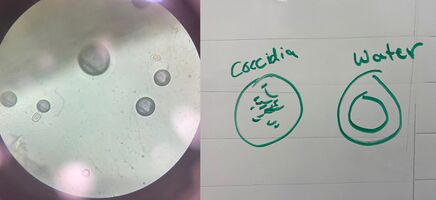Coccidiosis
Coccidiosis is a disease of animals kept under crowded conditions and caused by a protozoan parasite, Eimeria spp. Intensive, damp, and dirty conditions such as many breeding establishments predispose to coccidiosis.[1]
About the parasite
Coccidia strains are highly host- and site-specific, and infection occurs by ingestion of oocysts passed in the feces of infected rabbits. The oocysts require 48 to 70 hours outside the host to produce spores, are very resistant in the environment, and can survive for years. They can be spread through feed, soil, and any other substance that is capable of carrying infectious organisms (e.g. blankets, clothing, skin).
Ingestion of the oocyst releases sporozoites into the small intestine after the oocyst have been broken down by digestive enzymes. The sporozoites invade cells and cause tissue damage as they complete their complex life cycle.
As many as 14 species of Eimeria have been described in the rabbit. All but one species are found in the small intestine, cecum, or colon and cause intestinal coccidiosis. The species Eimeria stiedae inhabites the liver and causes hepatic coccidiosis.
There is no cross-immunity between the different species of Eimeria.[1]
Symptoms
The disease is often asymptomatic, but signs of the parasite include the following:
- Watery-to-mucoid, sometimes blood-tinged, diarrhea. The diarrhea may be intermittent.
- Weakness, lethargy, dehydration, and weight loss with heavy infections, especially in young rabbits.
- Can cause the inversion of the intestine (intussusception) and even death.
- With hepatic (liver) involvement, may see anorexia, weight loss (cachexia), depression, abdominal enlargement and pain, diarrhea, or acute death.
Causes
- Infected rabbits contaminating the environment.
- Poor sanitation.
Stress, debility, and concurrent disease can predispose older animals to infection.
Diagnosis
Diagnosis for coccidiosis is done by fecal flotation by identifying the oocysts in the feces or under the microscope by counting the coccidia per gram of feces.
- Did you know that there are 14 different species of Coccidia? Coccidia is a small parasite that commonly affects young bunnies before they develop immunity to it.
- The first image shows Coccidia eggs and water droplets under the microscope. The second image is a diagram of the difference between the two.
- Coccidia affects the intestines and, in some cases, the liver. Coccidia can cause anything from no clinical signs to soft faeces and poor growth, to severe liver damage and death.
- Coccidia is transmitted by faeces and it is recommended to keep all bunnies, especially young rabbits in a clean environment. Teaching your rabbit to use a litter tray can make this much easier.
Treatment
Anti-coccidiosis treatment is successful only for rabbits infected since 5 to 6 days.[2]
Current effective choices for medication include the following:
- sulphadimethoxine in drinking water - most effective[2]
- sulphaquinoxaline in drinking water
- sulphadimerazine in drinking water
- salinomycine (Bio-Cox)
- diclazuril (Clinicox)
- toltrazuril (Baycox)
The above treatments should be given to all rabbits for at least 5 days and repeated after 5 days.
Robenidine hydrochloride is also well tolerated by rabbits, but its preventative use over the past 20 years have raise the resistance of the protozoa to the drug.
The environment should also be regularly cleaned and disinfected with ammonia to prevent reinfection.
Experiences
The following are some experiences of bunny owners with coccidia.
- The Unusual Pet Vets. (2022). Ellie's story - baby rabbit required a blood transfusion, medication, fluids, and syringe feeding to help recover (Graphic)
- /u/StarkRavenMad007. (2014). Update and PSA: baby bun is in critical condition, infected with coccidia :(
- /u/odccomic. (2015). I had him for less than 48 hours...
Further reading
- MediRabbit, Esther van Praag, Ph.D., Protozoal enteritis: Coccidiosis
- NetVet.co.uk, Coccidiosis in Rabbits
- Charles River Laboratories International, Rabbit coccidiosis (Intestinal and hepatic)
- The Merck Veterinary Manual. (2015). Parasitic Diseases of Rabbits > Coccidiosis.
- Bird & Exotics Veterinarian, Coccidiosis in Rabbits
- Institute of Parasitology, Biology Centre ASCR, Michal Pakandl, Coccidia of rabbit: a review
- Amy Halls, M.Sc., Coccidiosis in Rabbits
- Wildpro, Intestinal Coccidiosis in Hedgehogs, Lagomorphs and Ferrets
- Wildpro, Hepatic Coccidiosis in Lagomorphs
- Galens Garden, Coccidiosis
- BunnyHugga, Coccidiosis
See also
References
- ↑ 1.0 1.1 Varga, M. (2013). Textbook of rabbit medicine. (2nd ed.).
- ↑ 2.0 2.1 Praag, EP. (n.d.). Protozoal enteritis: Coccidiosis. Retrieved 19 Dec 2019 from http://www.medirabbit.com/EN/GI_diseases/Protozoal_diseases/Cocc_en.htm


